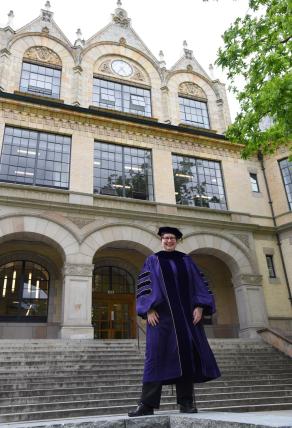I am excited to share that I recently defended my dissertation, Negotiating the German Public Sphere: Workers, Soldiers, and Women in Photobooks of Weimar Germany. My study shows how photobooks reuse previously published images and texts to specifically address workers, soldiers, and women. I highlight how these books employ montage strategies associated with 1920s Soviet Cinema to cast these three social groups as counter-publics. My analysis of Walter Benjamin’s Einbahnstraße (1928), Kurt Tucholsky’s Deutschland, Deutschland über Alles (1929) and Ernst Friedrich’s Krieg dem Kriege! (1924) reveals how these photobooks offer an alternative to the biased portrayals of these social groups in Weimar’s mass media.
My research has been supported by the American Friends of Marbach and the Kurt Tucholsky Stiftung. Their generous stipends granted me the opportunity to conduct research at the Deutsches Literaturarchiv Marbach, where I could particularly engage with Kurt Tucholsky’s oeuvre. An article on Tucholsky’s work, which I recently published in Studien zur deutschen Sprache und Literatur, highlights the intermedial aspect of its adaptation of a filmic and an industrial montage technique in order to specifically portray the working class.
My research is also grounded in Digital Humanities methods and informs my teaching as well. For example, Tucholsky’s photobook is at the center of my digital project Revolutionizing the Public Sphere in Weimar Germany – The “Invasion” of the Working Class, which I am currently developing using the online publishing platform Scalar. This project both complements my dissertation and serves as a textbook for a course I am developing on Weimar Germany’s visual culture. My engagement with the Digital Humanities has been very generously supported by UW’s Simpson Center for the Humanities. I am tremendously grateful that their support not only enabled me to work on my digital project, but also allowed me to frequently attend the Digital Humanities Summer Institute in Victoria, Canada.
I am also very grateful for the support I received from the Department of Germanics over the years, both as a scholar and as a teacher. It was a pleasure to work with every faculty member – be it as a graduate student in a variety of stimulating classes, as a teaching assistant for various courses or as a dissertator with my committee. In particular, I would like to thank my committee chair, Sabine Wilke, whose open door, advice and support during the last years shaped me both as a writer and as a scholar. I feel more than adequately prepared to move on to my position as an Assistant Professor of German at Georgetown University in Washington D.C.
